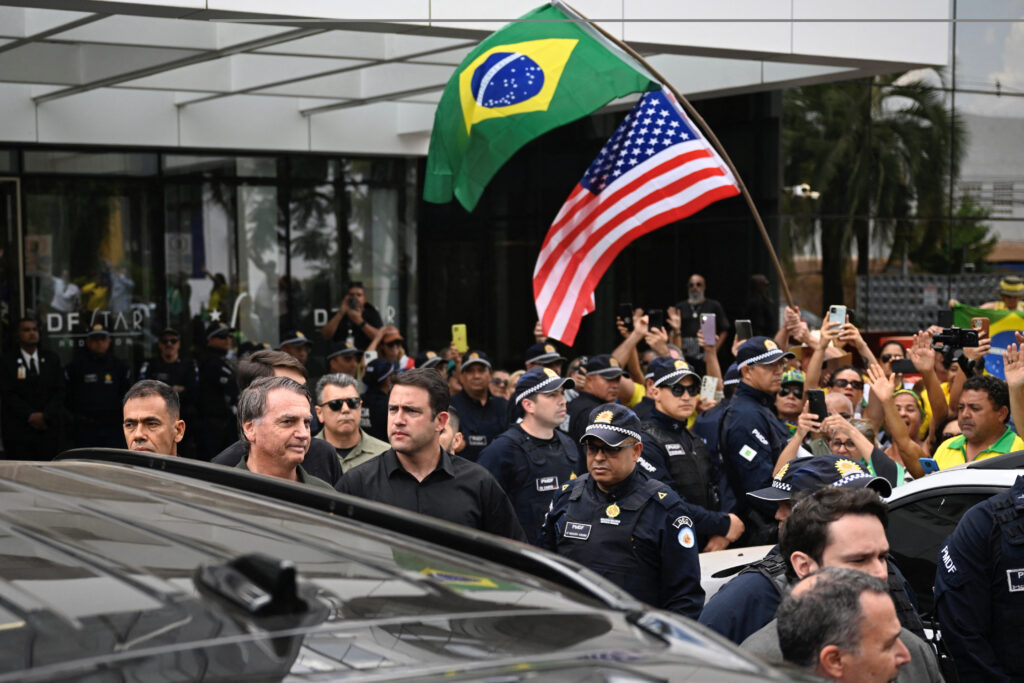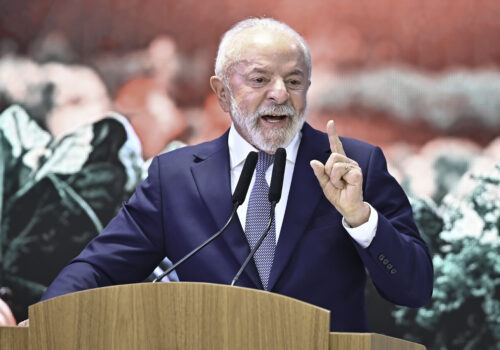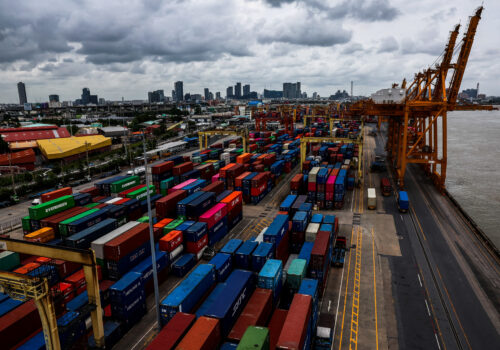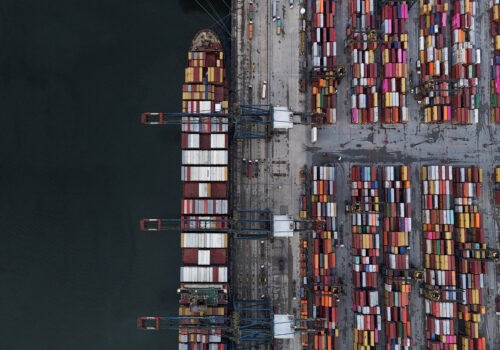Seven months after former Brazilian President Jair Bolsonaro was formally charged for his role in a coup attempt to remain in office despite his defeat in the 2022 election, a panel of five Brazilian Supreme Court judges made their decision last week. The court convicted Bolsonaro in a four-one decision, sentencing him to twenty-seven years and three months in prison.
The ruling, which also convicted seven of Bolsonaro’s allies, included charges on several counts. In addition to the coup attempt that encompassed plans to kill then-incoming President Luiz Inácio Lula da Silva and a Supreme Court justice, the court also found the defendants guilty of participation in a criminal organization, attempt to violently abolish the democratic rule of law, and damage qualified by violence. A fifth charge was for deterioration of listed heritage, for the damage caused to several Oscar Niemeyer-designed buildings and other historical objects in Brazil’s capital during the riots.
Bolsonaro may still try to appeal this decision. He has been under house arrest in the lead-up to the trial, and he has been ineligible to run for office for eight years since his 2023 conviction by the Superior Electoral Court for abuse of power.
As Brazil heads toward presidential election in 2026 amid increasingly strained relations with Washington, Bolsonaro’s conviction raises pressing questions about the future of US-Brazil relations and the country’s domestic political landscape.
Rising tensions between the United States and Brazil
The US-Brazil relationship has perhaps never been more tense—and the storm has not passed yet.
In August, US President Donald Trump imposed 50 percent tariffs on several Brazilian imports. In a letter to Lula in July, Trump justified the measure based on what he called a “witch hunt” against Bolsonaro, and he claimed that Brazil was engaging in unfair trade practices against the United States. At the same time, the Office of the US Trade Representative initiated an investigation under section 301 on unfair trade practices and treatment of US companies operating in Brazil. In a further escalation, the US Treasury Department in late July invoked the Global Magnitsky Act to impose sanctions and visa restrictions on Brazilian Supreme Court Justice Alexandre de Moraes, who oversaw Bolsonaro’s trial, as well as on other justices involved in the case.
The tensions between the two largest economies in the Western Hemisphere seem to be ratcheting up. Since the conviction, US Secretary of State Marco Rubio and other key figures in the Trump administration have openly expressed disapproval, threatening retaliatory measures against the Brazilian government.
If, for example, the United States were next to impose financial sanctions or regulatory actions against Brazil, then significant economic damage could result. Moreover, even if Lula wanted to make concessions to reduce or remove US pressure, implementing changes in Brazil would likely be difficult. Legislative or judicial steps over which Lula has no control would almost certainly be needed. On the other hand, the Brazilian government and private sector have sought to negotiate on the trade front. But politically, the message from Brasília has remained clear: Brazil has an independent judiciary, and its democracy and sovereignty are nonnegotiable.
The tension is unfortunately becoming personal. In an interview this week with the BBC, Lula was asked to describe his relationship with the US leader. “There’s no relationship,” he said. It will be worth watching next week, as well, when Lula and Trump are expected to speak at the United Nations General Assembly in New York, the US president immediately after the Brazilian president.
Given the underlying political reasoning for the tensions in the bilateral relationship, perhaps the most obvious possibility of de-escalation depends on the results of the next Brazilian presidential election. But that is not until October 2026.
Domestic politics and 2026 presidential election
In Brazil, Bolsonaro’s conviction has reshaped the country’s internal political dynamics, particularly the run-up to the 2026 presidential election and the future of Bolsonarismo as a political force.
In Congress, the Bolsonaro-supporting opposition continues to push for amnesty for those involved in the January 8 invasion of government buildings, in hopes that such a measure would also shield the former president. However, the chances of this succeeding are slim, and even if the amnesty bill passed, at this point, it might not be enough to free Bolsonaro.
Though the election is still a year away, the campaign is already taking shape. In a way, the US tariffs on Brazilian imports kicked off the electoral cycle. But despite the subsequent boost of Lula’s approval ratings for his response to Trump, this support is unlikely to last through to October of next year. With the ineligibility and now conviction of Bolsonaro, the opposition faces increased pressure to reorganize around a new viable leader capable of uniting its base and challenging Lula’s coalition. At least four governors politically close to Bolsonaro have shared their interest: Ratinho Júnior, the governor of Paraná; Tarcísio de Freitas, the governor of São Paulo and former minister of infrastructure under Bolsonaro; Romeu Zema, the governor of Minas Gerais; and Ronaldo Caiado, the governor of Goiás.
The focus now must be on de-escalation—both domestically in Brazil and in its relations with the United States. On foreign affairs, Brazil must continue to seek avenues of dialogue and negotiation on the basis of fair trade, increased bilateral investments, and the immense untapped potential of deepening bilateral economic relations. The opposite, allowing this strategic partnership to stall, would benefit neither Americans nor Brazilians.
Brazil is a young democracy. It wasn’t until 1989 that Brazil’s decades-long military dictatorship ended. Since then, Brazil’s democratic institutions have endured impeachment processes, corruption scandals, and, now, the unprecedented conviction of a former president for an attempted coup. These events underscore both the challenges and the resilience of Brazil’s maturing democracy. The 2026 presidential election will not solve all the country’s problems. But it will be an opportunity to move away from extreme polarization and toward political stability and democratic maturity.
Ricardo Sennes is a nonresident senior fellow at the Adrienne Arsht Latin America Center and founder and executive director at Prospectiva Public Affairs Lat.Am, a consulting firm in Brazil.
Valentina Sader is a deputy director at the Atlantic Council’s Adrienne Arsht Latin America Center.
Further reading
Wed, Aug 6, 2025
Trump’s tariffs are giving Lula a boost and shifting Brazil’s geopolitics
New Atlanticist By Thayz Guimarães
The tariff saga is not over, but it has already produced some unexpected political and geopolitical consequences for Brazil.
Fri, Aug 1, 2025
What to watch as Trump ratchets up global tariffs
Fast Thinking By
US President Donald Trump will raise tariffs on nearly every US trading partner. Atlantic Council experts take stock of what this means for the global economy.
Thu, Jul 17, 2025
The numbers that define the US-Brazil trade partnership
New Atlanticist By Valentina Sader, Ignacio Albe
The US president has threatened to impose a 50 percent tariff on Brazil in August. Before then, take a deep data dive into the current bilateral trade relationship.
Image: A person waves the U.S. and Brazilian flags, as former Brazilian President Jair Bolsonaro leaves the hospital where he went to undergo a skin surgery procedure, authorized by Supreme Court Justice Alexandre de Moraes, leaving the house arrest after being convicted by a Supreme Court majority of plotting a coup to remain in power after losing the 2022 election, in Brasilia, Brazil, September 14, 2025. REUTERS/Mateus Bonomi




